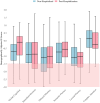Cognitive functioning in patients with neuro-PASC: the role of fatigue, mood, and hospitalization status
- PMID: 38994492
- PMCID: PMC11236596
- DOI: 10.3389/fneur.2024.1401796
Cognitive functioning in patients with neuro-PASC: the role of fatigue, mood, and hospitalization status
Abstract
This study sought to characterize cognitive functioning in patients with neurological post-acute sequelae of SARS-CoV-2 infection (Neuro-PASC) and investigate the association of subjective and objective functioning along with other relevant factors with prior hospitalization for COVID-19. Participants were 106 adult outpatients with Neuro-PASC referred for abbreviated neuropsychological assessment after scoring worse than one standard deviation below the mean on cognitive screening. Of these patients, 23 had been hospitalized and 83 had not been hospitalized for COVID-19. Subjective cognitive impairment was evaluated with the self-report cognition subscale from the Patient-Reported Outcome Measurement Information System. Objective cognitive performance was assessed using a composite score derived from multiple standardized cognitive measures. Other relevant factors, including fatigue and depression/mood symptoms, were assessed via the Patient-Reported Outcome Measurement Information System. Subjective cognitive impairment measures exceeded the minimal difficulties noted on objective tests and were associated with depression/mood symptoms as well as fatigue. However, fatigue independently explained the most variance (17.51%) in patients' subjective cognitive ratings. When adjusting for fatigue and time since onset of COVID-19 symptoms, neither objective nor subjective impairment were associated with prior hospitalization for COVID-19. Findings suggest that abbreviated neuropsychological assessment may not reveal objective difficulties beyond initial cognitive screening in patients with Neuro-PASC. However, subjective cognitive concerns may persist irrespective of hospitalization status, and are likely influenced by fatigue and depression/mood symptoms. The impact of concomitant management of fatigue and mood in patients with Neuro-PASC who report cognitive concerns deserve further study.
Keywords: COVID-19; Long COVID; anxiety; cognitive; depression; fatigue; hospitalization; post-acute sequelae of SARS-CoV-2 infection (PASC).
Copyright © 2024 Cahan, Finley, Cotton, Orban, Jimenez, Weintraub, Sorets and Koralnik.
Conflict of interest statement
The authors declare that the research was conducted in the absence of any commercial or financial relationships that could be construed as a potential conflict of interest.
Figures


References
-
- National Center for Health Statistics (2023). Long COVID. U.S. Census Bureau, household pulse survey. Available at: https://www.cdc.gov/nchs/covid19/pulse/long-covid.htm (Accessed June 1, 2024).
LinkOut - more resources
Full Text Sources
Miscellaneous

